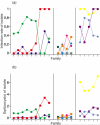Host genotype by parasite genotype interactions underlying the resistance of anopheline mosquitoes to Plasmodium falciparum
- PMID: 15644136
- PMCID: PMC548507
- DOI: 10.1186/1475-2875-4-3
Host genotype by parasite genotype interactions underlying the resistance of anopheline mosquitoes to Plasmodium falciparum
Abstract
Background: Most studies on the resistance of mosquitoes to their malaria parasites focus on the response of a mosquito line or colony against a single parasite genotype. In natural situations, however, it may be expected that mosquito-malaria relationships are based, as are many other host-parasite systems, on host genotype by parasite genotype interactions. In such systems, certain hosts are resistant to one subset of the parasite's genotypes, while other hosts are resistant to a different subset.
Methods: To test for genotype by genotype interactions between malaria parasites and their anopheline vectors, different genetic backgrounds (families consisting of the F1 offspring of individual females) of the major African vector Anopheles gambiae were challenged with several isolates of the human malaria parasite Plasmodium falciparum (obtained from naturally infected children in Kenya).
Results: Averaged across all parasites, the proportion of infected mosquitoes and the number of oocysts found in their midguts were similar in all mosquito families. Both indices of resistance, however, differed considerably among isolates of the parasite. In particular, no mosquito family was most resistant to all parasites, and no parasite isolate was most infectious to all mosquitoes.
Conclusions: These results suggest that the level of mosquito resistance depends on the interaction between its own and the parasite's genotype. This finding thus emphasizes the need to take into account the range of genetic diversity exhibited by mosquito and malaria field populations in ideas and studies concerning the control of malaria.
Figures

References
-
- Alphey L, Beard CB, Billingsley P, Coetzee M, Crisanti A, Curtis C, Eggleston P, Godfray C, Hemingway J, Jacobs-Lorena M, James AA, Kafatos FC, Mukwaya LG, Paton M, Powell JR, Schneider W, Scott TW, Sina B, Sinden R, Sinkins S, Spielman A, Toure Y, Collins FH. Malaria control with genetically manipulated insect vectors. Science. 2002;298:119–121. doi: 10.1126/science.1078278. - DOI - PubMed
MeSH terms
LinkOut - more resources
Full Text Sources

